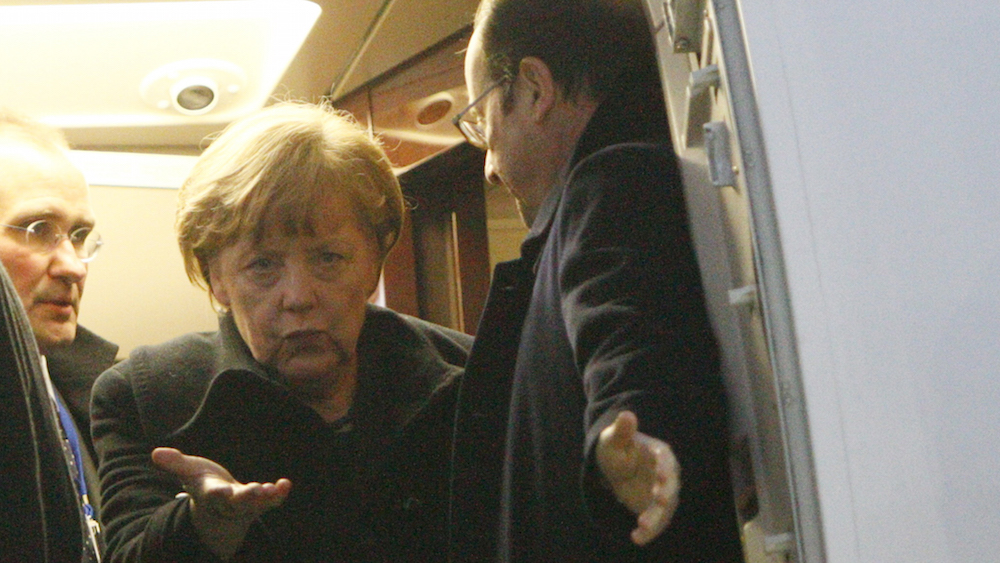Two approaches to policymaking are currently competing: one prefers to smash problems as they arise, while the other would rather disentangle them. Which one makes sense, and when?
It isn’t just words that separate French President François Hollande and German Chancellor Angela Merkel. The two heads of government represent two completely different approaches to analyzing and solving problems, a division which could be described as “decisions versus dynamics”. Both ways of thinking have influenced both European and German politics.François Hollande talks of war, deploying an aircraft carrier within a few days of the terrorist attacks in Paris and strengthening the French army’s air campaign against the so-called Islamic State (IS). Angela Merkel, meanwhile, promises to provide “all feasible support;” and while “all feasible support” sounds by no means indecisive, the formulation conveys her conviction that the fight to end jihadist terror and liberate Syria – and thus mitigate the flood of refugees – will require more than just military means.
“Decisionism” assumes that decisions are the means, measure, and goal of policy-making. In the worldview of a decisionist like Hollande, the present crises require quick decisions, while “false decisions” cause further crises – as Merkel’s decision to suspend Dublin II for a few days supposedly first triggered the refugee crisis.
Angela Merkel’s explanation of the refugee crisis is much simpler, and at the same time much more comprehensive. “The question of what resolution we want is just as important in this debate as the recognition that we do not live in a vacuum,” she said recently in an interview with the Frankfurter Allgemeine Zeitung. “We live in a world in which no country is sheltered from the crises and catastrophes in other regions, as perhaps they were fifty years ago.”
It was not the decision of a politician that triggered the refugee crisis; instead, the crisis can be traced back to a dynamic made up of many individual elements, including the unbearable situation in the countries of origin (and the refugee camps) and the expectation of receiving a reasonably friendly welcome in Europe, especially in Germany. The crisis drew on two further factors, which should not have come as surprises in this era of globalization and digital communication: first, a refugee economy, a market that adapted itself quickly and flexibly to meet a need, and which allowed not just professional transporters, but also anyone with knowledge of the migration routes and a boat or truck to play a role; and second, technology developed at Silicon Valley-level speed to transmit vital information over apps and websites about escape routes, transporters, approval periods for asylum applications in various European countries, and the conditions of shelters.
Long-Brewing Problems
Dynamics develop out of long-brewing, often easily recognizable problems, like the economic, political, and cultural stagnation in the Arab world or the corruption and kleptocracy in Ukraine, which had gone unchallenged for the past twenty years. It was never one bad policy that caused these crises, but rather the combined effects of many bad policies. It is, however, hard to say when a dynamic will finally boil over into a crisis; it is often a moment of self-emancipation, an “enough is enough”, as was finally the case in both the Arab world and Ukraine. These ground-level movements are not always democratic, either – IS is a ground-level movement, one that developed from the Iraqi civil war and advanced in Syria.
One does not need a crystal ball to see after the financial crisis, the uprisings in the Arab world, the crisis in Ukraine, the civil war in Syria, the strengthening of IS, and, above all, the refugee crisis, that there will be more long-brewing, fast-developing dynamics that demand our attention in the future.
The causes of a dynamic are unimportant to a decisionist like Hollande. He lacks the patience to untie complicated knots – or at least wishes to appear too decisive to be patient. He thinks in terms of legislative periods and opinion polls, and fears nothing more than to appear indecisive. The decisionist establishes an ultimatum – as did Horst Seehofer, who in October demanded Angela Merkel “end the waves of refugees by All Saints’ Day.” Or, like Hungarian Prime Minister Viktor Orbán, he has no patience to apply long-term tools to immediate crises. He wants solutions – and he wants them now. He does not rely on cooperation or consensus, because they take too much work. No wonder Horst Seehofer visited Orbán at the climax of the refugee crisis – decisionism unites them.
Don’t Disturb the Decisionist
Decisionism, however, is not only impatient – it is at its core autocratic, because it does not have room for those who want to change policy from below. When asked whether or not he understood that the Gezi Park demonstrators actually wanted nothing more than to participate in the shaping of their city, Turkish President Recep Tayyip Erdoğan answered full of consternation that he had already given the citizens of Istanbul a bridge over the Bosporus and a third airport, for which they should be thankful. It is, simply put, unacceptable to disturb the decisionist with unqualified backtalk. He knows what’s best for everyone.
Former KGB agent Vladimir Putin cannot imagine that protests – whether in Moscow, Kiev, or elsewhere – could be possible without the influence of some foreign enemy decisionist. He sets his own decisive actions against these (in his mind) externally directed dynamics – in this case the “heroic” annexation of Crimea.
Dynamism necessitates wide-ranging and concerted investigation of causes, and incorporates many factors when assembling a picture of an entire situation. Decisionism is the complete opposite – it crudely simplifies convoluted situations. Analysts have observed for some time now that Vladimir Putin surrounds himself exclusively with a small circle of advisors, refusing to accept input from different sources. In the Kremlin, lone decision-making and unilateral action rule, all the more so when other players, like the US and Europe, do not decide and act – as in the case of Syria.
Of course, for Putin, Russia’s intervention in Syria is really about the rescue of another once-strong decisionist, Bashar al-Assad. Aside from this relatively clear strategic goal, however, Putin seems to have gotten himself involved in this adventure without a deep understanding of the various actors in play. For anyone aside from Putin, Syria presents a complex puzzle: how can the interests of dozens of local groups – along with those of regional powers, wannabe superpowers, post-superpowers, and one-time colonial powers invested in the country – be reconciled? For a decisionist like Putin, these questions are hardly a concern at all.
In a 21st century of political, economic, and digital interconnection, however, decisionism may not be the most appropriate style of policy-making. Though it offers strong, aggressive solutions to urgent problems, it also risks phenomenal frustrations. If the refugee crisis is not immediately solved, the decisionist and his followers immediately begin to see democracy, the European project, and the entire Occident in danger – for the decisionist, each problem has its own switch, one that only turns on or off.
The Dynamist’s Mixing Board
But where the decisionist has a single switch, the dynamist uses a whole mixing board, one that can turn up the volume of some tools while muting the effects of others. The dynamist knows that they will never completely stop a dynamic, but hopes that, by applying many tools simultaneously, coordinated with each other if possible, they can steer it in a manageable direction. Dynamism is not about quick responses, but rather comprehensive and cooperative action oriented towards the long-term future. In the case of the refugee crisis, that means close cooperation between the chancellery and the various ministries, along with the federal states, communities, European neighbors, and Brussels, on national, European, and global levels, to find cooperative solutions – from the basic construction of refugee homes to ideas for ending the Syrian conflict.
A new realism does not necessarily mean a conflict between values and interests. Instead, it means recognizing dynamics, scaling down ambitions to the level of the possible, and, yes, working with a few unsavory partners to bring a little order. What is not sustainable in any way is an order that is achieved through rash interventions in the Middle East, or one that attempts to defend Arab autocrats at all costs. Orders are sustainable when they are flexible enough to accommodate internal dynamics; social contracts are sustainable when they guarantee a certain level of participation, and render “enough is enough” moments superfluous, or at least manageable.
The defining statement of Chief Dynamist Angela Merkel is not her now-emblematic “Wir schaffen das” (“We can manage this,” or, “We can do it”). Instead, it is her constant refusal to offer “Scheinlösungen”, or false solutions. Merkel, in her typically toned-down rhetoric, expressed it like this: “I want people in a few years to say that we have achieved something in an orderly manner in a complicated world.” That is today’s realism.
For centuries, Alexander the Great’s macho cutting of the Gordian Knot was considered the perfect example of decisive action. No one ever seems to remember that with this act a still-usable string was shredded, and the chariot of the Phrygian king irrepairably damaged. In the 21st century, a less heroic, perhaps even feminine ability is required: the patience to untangle.
Read more in the Berlin Policy Journal App – January/February 2016 issue.








